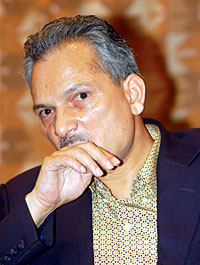 BIKRAM RAI |
At the SAARC Summit last week, Prime Minister Baburam Bhattarai exhorted South Asian leaders to walk the talk and deliver on the lofty declarations of the past. He may as well have asked himself whether he is doing the same back home.
The initially ga-ga mainstream media has done a dramatic turnaround and remarked on a badly tarnished halo effect. We don't know yet if this is also reflected in public disillusionment with Bhattarai, but it can't be disputed that the prime minister's brand equity has taken a battering in the past two weeks.
Not very long ago, when the opposition flagged his ride in a Mustang as a populist move, the public support for austerity measures taken by the Prime Minister forced even the critics to acknowledge it as exemplary symbolism. But all that seems to be a distant memory now as he rides in to bumpy political landscape in an over-crowded 49 seater that threatens to
derail.
A prime minister who made austerity his guiding principle has made decisions which have not only put an astronomical price on the peace process, but also led to his personal political bankruptcy. But what really takes the cake is the way he has misused his office to influence cases against Agni Sapkota, Prabhu Sah and Balkrishna Dhungel. A man the nation trusted as a statesman has not been able to rise above partisan interest.
Many war time atrocities need to be investigated by a future Truth and Reconciliation Committee (TRC) but political motives alone do not explain many of the human rights violations during the war. It is indefensible that cold-blooded murder of an unarmed individual has been pardoned on "political" grounds.
Baburam Bhattarai must also realize that he leads a government which he himself attributed as having a historical task of bringing together ideologically diverse political groups to converge on issues of national consensus. His inexplicably explicit role in the Dhungel case will put him on a collision course with the judiciary and undermine his stated goal to make progress on the peace process.
Returning from the New York visit, Maoist chairman Puspa Kamal Dahal was quick to defend Bhattarai's move, saying the pardon had been decided by the previous government. To reduce this case to a mere technicality and to argue that the government has constitutional powers to absolve wrongdoing makes a mockery of justice and is an insult to Ujjan Shrestha's still grieving relatives. It's not so much about what the government can or cannot do, but about what it ought or ought not do.
While one party of the conflict is under the scanner, nobody has dared to call for investigation into the crimes perpetrated by the Nepal Army. There seems to be a conspiracy of silence among the two warring sides to brush their past atrocities under the carpet.
Theorists argue that claim to absolute truth overlooks its relativity and context. Hence, the call for justice in Ujjan Shrestha's murder must not eclipse the larger need to provide justice for all.



